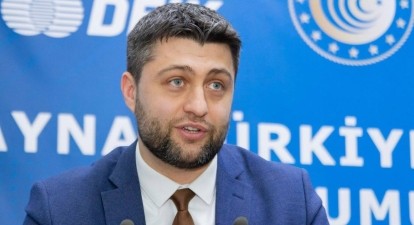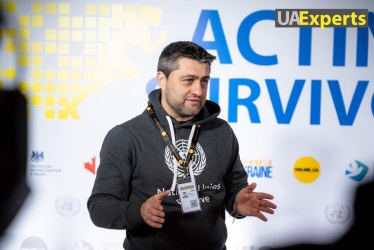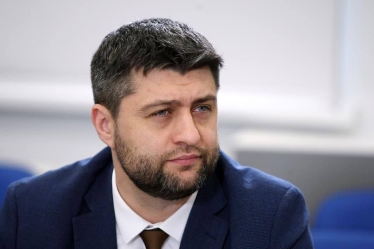The topic of prevention, response and rehabilitation of people suffered from sexual violence during the full-scale invasion of Russia, however paradoxical, requires lobbying not only among our international partners, but also to a greater extent should be directed at the domestic audience: the parliamentary corps, government and the public sector.
Social lobbying on what seems to be very understandable and extremely urgent issues during the war requires additional efforts and even some civic courage. Social lobbyist Serhii Nizhynskyi explains: ʼBefore I went to the UN Office in Geneva, I carefully studied the members from Russia and strategic partners from the UK and the US. This is an opportunity to draw up a social portrait of the interlocutor and formulate the issues for discussion as clearly as possible.ʼ
In your opinion, what are the benefits of delegationsʼ visits to the UN and what is the use of them?
For me, the selection of delegations to the UN for the Assembly, conferences and roundtables is extremely important. Anyone who does not understand the importance of such events should not go there for the sake of appearance, because it is an A-level official and, accordingly, it has to go. In fact, such trips play a huge role for the state, and the strategy of state behaviour should be thought out in advance.
For example, the last time I went to Geneva, I studied the members from Russia and strategic partners from the UK and the US. This is an opportunity to draw up a social portrait of the interlocutor and formulate the issues for discussion during breaks, lobbies and interruptions of the official part as clearly as possible.
It is important that each minister or its deputy goes to such events with prepared issues of concern in their own area of work. In particular, there is a unique opportunity not to go to different countries for negotiations, but using such congresses to give an impulse to your vis-a-vis to speed up bureaucratic issues (accelerate agreements and commitments between countries that have not been able to move forward for years due to changes in governments, non-priority of these issues, etc.).
We need a clear ʼbilateralismʼ on the eve of such Assemblies, and believe me, you will be able to improve your own performance in your areas and speed up the resolution of issues that have accumulated in your agency during visual contact and in the corresponding emotional business environment.
It is a misconception that representatives of the Ukrainian embassy or mission abroad already owe you something or owe the delegation something in such work. As you from Ukraine organise the process, so will be your visit.
Sometimes your appearance and friendly networking are more important than your knowledge of a foreign language, because you never get a second chance to make a first impression. Plan your negotiations in advance, make arrangements, organise a business breakfast before the event, and this will lead to a greater result than your correspondence with partners over the years.
In your opinion, where does Ukraineʼs position on international social issues ʼlose groundʼ, and what should be emphasised, given that you are an expert on social integration and migration?
ʼSpeak so that I may see you,ʼ said Socrates. Our problems and memoranda are of interest only to ourselves. Ratification of conventions and agreements that Ukraine needs and that we have initiated is also of primary interest to us. Therefore, we should not wait for a long time for a response, but get it as quickly as possible, at any cost, from our partners or opponents. Because you need it, even if you have to work for them to get it!
It is also important to establish an algorithm of interaction between the Ministry of Foreign Affairs – the Ministry of Social Policy – the Ombudsmanʼs Office – the Cabinet of Ministers. The Security Service of Ukraine and the Foreign Intelligence Service should be involved separately. I say ʼestablishʼ because it is a matter of lineal subordination with the people you meet in your area of work, not general interaction on paper, according to the allocation of responsibilities, etc. Sometimes everyone complains about each other, instead of coming together, setting a common goal and working together to achieve it.
What does the work of the public sector, in particular your NGO UA Experts, which is now quite recognisable in the UN and international institutions, bring to us? What is the role of the public sector during the war? You were Deputy Minister of Social Policy for European Integration in 2019-2020, does this experience help you now?
I know one format of success and effectiveness – professional perseverance and communication. Nowadays, the public sector plays a huge role, which not all officials play, because they perceive a person first, and then the organisation they represent. And whether it is a ministry or a public association, there is no difference.
Someone performs trainings for 10-15 people and thinks that they are significantly helping the country in the war, while someone raises the bar higher and makes sure that even President Bidenʼs report includes a component that is lobbied and defended by the public sector.
Are you referring to the recent report by Joe Biden, who cited a component of your work with UNFPA Ukraine to help victims of sexual violence in his report on Ukraine? According to some human rights defenders, the term ʼvictimʼ should not be used?
I mean that the ratings for the country are formed by the coordinated actions of the public and state institutions. The public sector creates needs and meets challenges, and the state should support it. And vice versa. If all this takes place in unison, there is a result. Our joint actions are monitored by foreign partners to give ratings to the country. And ratings mean financial assistance, solidarity and support (if they are high or just decent). Anti-ratings are the inability to enter relevant international social circles and organisations, the lack of financial non-refundable aid, and eternal loans for our children…
Regarding the term ʼvictimʼ, I have an alternative opinion, and I am glad that it is supported by the Head of the Department of Comparative Law of the Institute of International Relations, Mr. Bilas. In fact, when there is social work and the involvement of social workers and psychologists, everyone is of the opinion that the word ʼthe injuredʼ should be used and changed everywhere in the legislation. Why is this not quite right? Because the word ʼvictimʼ is much broader in legal terms than ʼthe injuredʼ. The translation of the Conventions is also appropriate – victims, and this is definitely not an ʼinjuredʼ person… We have laws in Ukraine on ʼwar victimsʼ, and the Balkan experience proves that the interpretation of ʼvictimʼ gives a clear understanding of the need for reparations, because we are talking about international consequences.
When we advocate that the victims of sexual violence are facts of genocide against the Ukrainian people, these are narratives for the ages that we must convey to the international community
But some officials who have been in office since Yanukovychʼs times mix up the use of international terminology and obscure the difference between these words and deliberately confuse psychologists and human rights lawyers working on reparations.
I am sure that the Foreign Intelligence Service and the Security Service of Ukraine are following such narratives and, I think, will soon provide an appropriate assessment of these actions, because it seems that such narratives are being implemented so that in the future no one will be able to legally cement their right to compensation for reparations from the actions of the Russian Federation.
What do you see as the main threat or problem in the international sphere today? Many institutions and special projects of the social sphere to help victims and injured persons are being implemented simultaneously in Ukraine.
The main threat now is the confusion of Ukrainian officials on the international stage and the division and duplication of their responsibilities. As a constitutionalist, I canʼt bring myself to call anyone in Ukraine ʼCommissioner for the Rights of Somethingʼ, because Ukraine has an institution called the ʼCommissioner for Human Rights of the Verkhovna Rada of Ukraineʼ – and thatʼs that. Accordingly, its representatives represent this institution in Ukraine and abroad. In my opinion, any other interpretation of positions such as ʼCommissionerʼ and so on is an abuse of the Constitution of Ukraine. Someone abroad calls itself a ʼCommissionerʼ, but itis the head of a department with a staff of two persons; someone calls itself a special commissioner, but spells it out differently in its own Regulations. However, if people’s deputies had applied to the Constitutional Court for an interpretation, I am sure that such confusion would not have existed. Perhaps I am wrong, but I have the right to this opinion and I have the support of the legal community in this regard. At the same time, I would like to explain this to the international community, because this is not an international mission with similar names, where this practice was ʼborrowedʼ. This is a State with a functioning Constitution, which is polluted by such things.
What are your wishes for young human rights defenders as a true social lobbyist in Ukraine – what does Ukraine need now to strengthen its interests in the national stage?
In fact, motivation and love are very important. If you donʼt develop these feelings in yourself, then the rest of your professional skills will be useless. Helping a loved one motivates you to help more people, and then to protect them in the national and international stage.
To strengthen the international stage, I certainly see selection from the skill pool and some young promising individuals. Now is their time. The long-service retirement age for Ambassadors should be a thing of the past. There should be a patriotic, extraordinary, but, of course, professional selection of people, because we have people. A well-known quote should be the best motivation for young people: ʼA person is born twice: when it is physically born and when it understands what for.ʼ
Вы нашли ошибку или неточность?
Оставьте отзыв для редакции. Мы учтем ваши замечания как можно скорее.











